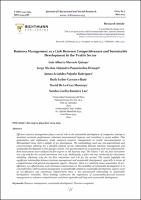| dc.contributor.author | Marcelo Quispe, Luis Alberto | |
| dc.contributor.author | Papanicolau Denegri, Jorge Nicolás Alejandro | |
| dc.contributor.author | Pajuelo Rodríguez, James Arístides | |
| dc.contributor.author | Carrasco Ruiz, Ruth Esther | |
| dc.contributor.author | De La Cruz Montoya, David | |
| dc.contributor.author | Ramírez Lau, Sandra Cecilia | |
| dc.date.accessioned | 2024-06-06T19:01:26Z | |
| dc.date.available | 2024-06-06T19:01:26Z | |
| dc.date.issued | 2023 | |
| dc.identifier.uri | https://hdl.handle.net/20.500.13067/3220 | |
| dc.description.abstract | Efficient resource management plays a crucial role in the sustainable development of companies, aiming to maximize economic performance, minimize environmental impacts, and contribute to social welfare. This quantitative and explanatory study analyzed resource management in textile microenterprises in Metropolitan Lima, with a sample of 370 participants. The methodology used was non-experimental and cross-sectional, allowing for a detailed analysis of the relationship between business management and sustainable development in this specific context. Two questionnaires of 20 questions each were administered. Both instruments were validated by five experts in the business area. The Aiken's V for the first instrument was 0.83 and for the second instrument was 0.79. Additionally, a pilot test was conducted for instrument reliability, obtaining 0.89 for the first instrument and 0.81 for the second. The results highlight the significant relationship between business management and sustainable development, especially in terms of competitiveness and general management aspects. However, there is a relatively lesser association of eco-efficiency, eco-effectiveness, and continuous improvement in the variability of sustainable development. It is concluded that, while business management is considerably related to sustainable development, aspects such as eco-efficiency and continuous improvement show a less pronounced relationship in sustainable development variability. These findings underscore the importance of sustainability-focused business management to enhance competitiveness and foster equitable and long-term sustainable development. | es_PE |
| dc.format | application/pdf | es_PE |
| dc.language.iso | eng | es_PE |
| dc.publisher | Richtmann | es_PE |
| dc.rights | info:eu-repo/semantics/openAccess | es_PE |
| dc.rights.uri | https://creativecommons.org/licenses/by-nc/4.0/ | es_PE |
| dc.subject | Resource management | es_PE |
| dc.subject | Sustainable development | es_PE |
| dc.subject | Peruvian companies | es_PE |
| dc.title | Business Management as a Link Between Competitiveness and Sustainable Development in the Textile Sector | es_PE |
| dc.type | info:eu-repo/semantics/article | es_PE |
| dc.identifier.journal | Journal of Educational and Social Research | es_PE |
| dc.identifier.doi | https://doi.org/10.36941/jesr-2024-0052 | es_PE |
| dc.subject.ocde | https://purl.org/pe-repo/ocde/ford#5.02.04 | es_PE |
| dc.source.volume | 14 | es_PE |
| dc.source.issue | 3 | es_PE |
| dc.source.beginpage | 27 | es_PE |
| dc.source.endpage | 35 | es_PE |


